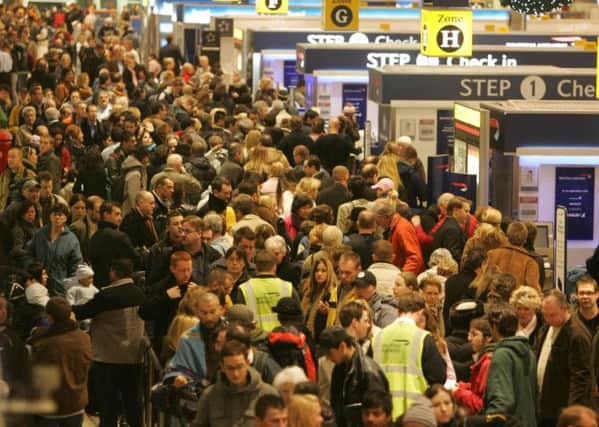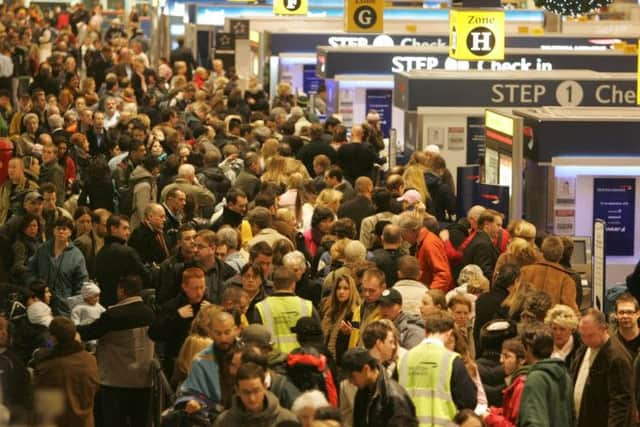Briton ‘dies of Ebola’ as UK to screen airports


Downing Street announced passengers would face further questioning and possible health checks as it emerged that a British man was suspected to have died of the disease in Macedonia.
The death of the man, who has not been named, was announced by a senior Macedonian official. A British national who had been travelling with the man said that the individual had not visited any of the countries currently affected by the disease.
Advertisement
Hide AdAdvertisement
Hide AdA Foreign and Commonwealth Office (FCO) spokesman said: “We are aware of the reports and are urgently looking into them.”


The outbreak of the disease has already killed more than 3,000 people and infected more than 7,200 – mostly in West Africa.
The ramping up of UK health checks followed advice from the chief medical officer Professor Dame Sally Davies, Downing Street said last night.
The screening will be introduced for passengers travelling from the affected regions – Liberia, Sierra Leone and Guinea. However, experts have said that screening passengers will not prevent the deadly disease from reaching Britain and that it is inevitable that there will be cases in the UK.
A Downing Street spokeswoman said: “Airport screening at airports in Liberia, Sierra Leone and Guinea has been in place for some weeks to ensure all passengers leaving affected countries are checked.
“Further screening has been kept under review throughout this period and advice from the chief medical officer today is that enhanced screening arrangements at the UK’s main ports of entry for people travelling from the affected regions – Liberia, Sierra Leone and Guinea – will offer an additional level of protection to the UK.”
The spokeswoman said that the screening would involve assessing passengers’ recent travel history, who they had been in contact with and onward travel arrangements, as well as a possible medical assessment.
Advertisement
Hide AdAdvertisement
Hide AdAll checks will be conducted by trained medical personnel, rather than Border Force staff, who will also issue advice on what to do if travellers start to develop symptoms later.
Prof Dame Davies, said it was right to consider further measures to make sure potential cases of Ebola are identified as quickly as possible in the UK.
She said: “Although the risk to the UK remains low, in view of the concern about the growing number of cases, it is right to consider what further measures could be taken, to ensure that any potential cases arriving in the UK are identified as quickly as possible.
“Rapid access to healthcare services by someone infected with Ebola is not only important for their health but also key to reducing the risk of transmission to others.
“These measures could include a further UK-based package of measures to identify and assess the health status of passengers arriving from the affected countries and to ensure that those individuals know what to do should they be taken ill whilst in the UK.”
The announcement follows confusion earlier in the day over whether the government was introducing screening or not, amid calls for tests to be implemented after the United States put in place similar measures at some airports.
Chancellor George Osborne had said screening would be introduced if medical experts said it was necessary.
He added: “If the medical advice is we need to screen – it might well be – then we will absolutely take that action.”
Advertisement
Hide AdAdvertisement
Hide AdMeanwhile, the Department of Health had insisted it had no plans for screening, while Defence Secretary Michael Fallon said the existing government policy was in line with World Health Organisation (WHO) advice that exit screening was more effective.
A statement on the Department of Health website, now removed, had said: “The overall risk of Ebola to the UK remains low. Entry screening in the UK is not recommended by the World Health Organisation, and there are no plans to introduce entry screening for Ebola in the UK.”
Professor George Griffin, the chairman of the advisory committee on dangerous pathogens, which advises the government and Public Health England, warned that testing travellers for signs of fever was unlikely to prove effective.
He said that it would not have detected the first Ebola sufferer patient to be diagnosed in the US – Thomas Eric Duncan – who died on Wednesday in a Texas hospital.
He added: “Screening just for body temperature is a very ineffectual tool. We know the clinical course of the disease now very well – a maximum incubation period of 21 days and fever is only part of the clinical syndrome at the end of that period.
In the US, Thomas Frieden, the director of the Centers for Disease Control and Prevention (CDC), told said that a rapid global response would ensure that it did not become “the next Aids”.
At a high level meeting of the World Bank in Washington, he compared the spread of Ebola to the disease:“I would say that in the 30 years I’ve been working in public health, the only thing like this has been Aids.”